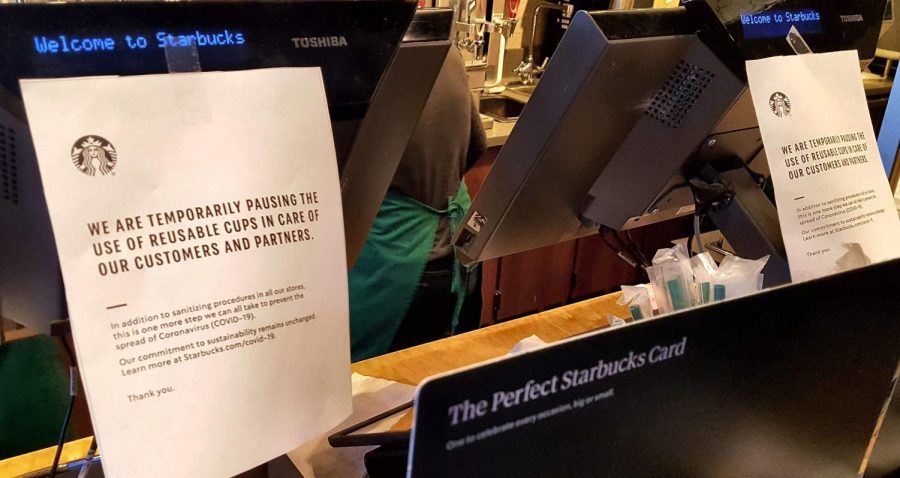Have your hands ever been this clean?
Posters taped to a register at a Starbucks in Charlottesville, Virginia letting customers know that reusable cups will not be used during the ongoing COVID-19 outbreak.
May 3, 2020
Washington was the first state impacted by the COVID-19 pandemic, making it necessary for our governor to shut down the state except for essential businesses.
Some of the essential businesses include people in healthcare, food industries, emergency and first responders, and transportation. While most people were required to follow that “stay home” order by Governor Inslee, the essential workers had to adapt to keep themselves safe while continuing to go to work.
In health care, there has been a huge change in entering a clinic or hospital. Every employee is required to take their temperature at night and in the morning before coming to work. Anybody going into the medical centers will have their temperature taken and will be screened with these questions:
1. Have you had a fever?
2. Have you been exposed to anyone with COVID-19
3. Have you had flu-like symptoms or loss of the sense of taste?
“The medical centers changed drastically when the coronavirus hit Seattle” said Dr. Lori Brennan at Virginia Mason Hospital. “First, the hospitals created dedicated floors for patients with the virus and people being tested. Each room had to be modified to become a negative pressure room. Health care workers going into the room have to follow the strict guidelines to properly put on and take off the personal protective equipment (PPE).”
The most unprecedented change hospitals have made is to prohibit visitors in the building; even when family members are dying, only one person is allowed to accompany a patient during a doctor visit.
Other changes include most of the tables in the cafeteria have been removed except for a few that are spread far apart, as well as cancelling unnecessary appointments and surgeries in order to save the PPE supplies for COVID-19 patients.
Outside of health care, restaurants have been responding to the required closure of patrons dining inside the restaurants by keeping their businesses open for take out. Many restaurants are doing this to stay in business, pay the mortgage, and keep their workers employed.
“I have had to sanitize everything almost every hour,’’ said senior Anais Erbe, a Starbucks barista. “I have to wash my hands after making every drink or touching money. Starbucks has also installed a plastic barrier at the register to keep customers 6 feet away from us”.
The grocery industry had a huge increase in business when reports that the coronavirus was rapidly spreading and possible quarantine requirements were announced in the news. People flocked to the grocery stores and hoarded supplies, creating a huge spike in the supply chain demand.
“It was mayhem in the produce brokerage business!” said Steve Brennan, a produce broker for Bloxum. “I couldn’t keep up with the demands of my customers. They just kept telling me to send all the potatoes and onions I could find. I had companies I don’t even work with calling me to get supplies. Unfortunately, I had to turn them down. But recently it has slowed down a little bit as the fear in people subsides.”
Grocery stores have also had to make serious adjustments to provide a safe environment for the employees and customers. Some of these precautions include having stickers on the ground at checkout indicating a six foot separation of people in line, limiting how many people may enter the store at a time, putting up plastic shields at the cash registers, not allowing reusable bags in the stores, hand sanitizer stations at all entrances, and having the cashiers wear masks and sanitize their work areas frequently.





